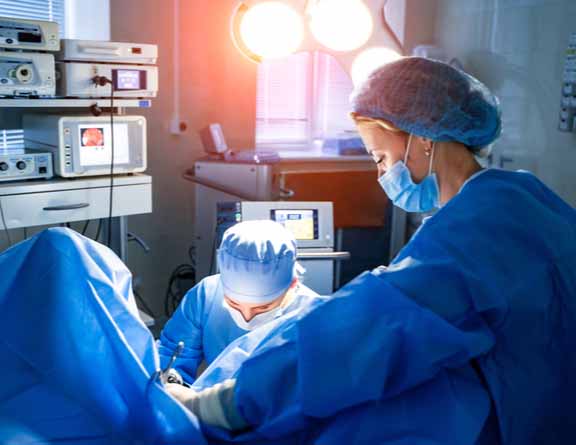
Avadi
USFDA Approved Procedures
No Cuts. No Wounds. Painless*.
Insurance Paperwork Support
1 Day Procedure


Treatment And Its Procedure
Gastric Ballooning Treatment is a simple weight loss procedure that initiates weight loss by swallowing a soft yet durable gastric balloon into your stomach. This weight loss treatment helps overweight patients eliminate excess weight without surgery. The gastric balloon is a stomach balloon, an inflatable medical device temporarily placed into the stomach that naturally exits the body. The balloon helps induce weight loss by enhancing satiety, slowing gastric emptying, and minimizing the food eaten during each meal.
Non-invasive and non-endoscopic gastric balloon treatment is a promising substitute for traditional endoscopic balloon treatment. Pristyn Care now offers the Allurion Program, using the world’s first swallowable balloon pill. Allurion Gastric Balloon Treatment results can last a lifetime, and you can achieve 95% sustained weight loss in 1 year. It is a 6-month holistic weight-loss program where you will be backed by the Allurion Connected Scale, Health Tracker, and App. So contact Pristyn Care and lose 15% of body weight in ~16 weeks.
Step-By-Step Procedure Under The Gastric Balloon Treatment
Bariatric surgery is a surgical operation that helps people lose excessive weight and works by modifying our digestive system. It modifies the stomach, and sometimes the small intestine — to control the calorie quantity you consume and absorb. In addition, it lowers the number of hunger signals that move from the digestive system to the brain. But bariatric surgery is not an easy job; it requires adequate preparation and deep-rooted lifestyle changes to be successful.
Before undergoing bariatric surgery, you need to consult a bariatric surgeon. The surgeon will understand your concerns and preconditions and if there is a genuine need for the surgery. In addition, the surgeon will also ask about your medical history, perform a physical exam, and order blood tests if required.>
During the consultation and at consecutive steps, the surgeon will discuss your weight-loss aims and which type of bariatric surgery suits you. Bariatric surgery has three kinds: Gastric Bypass, Gastric Sleeve Surgery, and Biliopancreatic Diversion with Duodenal Switch (BPD-DS). Most types of bariatric surgery are performed using general anesthesia and laparoscopically.
A laparoscope is a small instrument with a camera attached. The laparoscope is inserted through small incisions in the abdomen. The tiny camera on the tip of the laparoscope helps the surgeon see and operate inside the abdomen without making large incisions. Bariatric surgery usually takes several hours, and depending on the type of surgery performed, you may need to stay a few days in the hospital.
Delivering Seamless Surgical Experience in India
Your safety is taken care of by thermal screening, social distancing, sanitized clinics and hospital rooms, sterilized surgical equipment and mandatory PPE kits during surgery.
A dedicated Care Coordinator assists you throughout the surgery journey from insurance paperwork, to free commute from home to hospital & back and admission-discharge process at the hospital.
Our surgeons spend a lot of time with you to diagnose your condition. You are assisted in all pre-surgery medical diagnostics. We offer advanced laser and laparoscopic surgical treatment. Our procedures are USFDA approved.
We offer free follow-up consultations and instructions including dietary tips as well as exercises to every patient to ensure they have a smooth recovery to their daily routines.
Gastric balloon treatment is considered the safest form of weight loss treatment compared to other treatments, including bariatric surgery. It is because it helps obese patients throw off excess weight without surgery.
Weight loss surgeries are safe compared to the threats of living with obesity for an entire life. Gastric balloon treatment and bariatric surgery are among the safest and most successful treatments for weight loss.
You may be able to tighten the loose skin after weight loss surgery by having nutrients like collagen, performing resistance training, and undergoing medical procedures.
The medical guidelines for weight-loss surgery are based on body mass index (BMI). Weight-loss surgery might be an option for an adult with a BMI of 40 or higher. In addition, surgery can also be performed if your BMI is greater than or equal to 35 and you go through weight-related health complications, like type 2 diabetes and high blood pressure.
The doctor can conduct diagnostic tests like EKG, barium swallow, and stress tests before your weight loss treatment.
Avoid rice, bread, raw vegetables, fresh fruits, and meats that are not easily chewed, like pork and steak. Also, avoid drinking carbonated beverages and chewing ice.
After any weight loss surgery, it is advised to walk. The key is to begin slowly and listen to the body. If you lift weights, stay low-impact for the first month. If you experience pain, stop and relax.
After a weight loss treatment like bariatric or gastric ballooning, most patients return to work after 2 to 4 weeks. In the case of gastric balloon treatment, a person can return to work even earlier.
To ensure you are completely informed about your weight loss surgery, make a list of questions for the doctor. Here are some of the questions to get you started:
Weight loss treatments like gastric ballooning and bariatric surgery can be highly transformative for people who want to lose weight. These weight loss treatments can result in sustainable weight loss in obese people and those without long-lasting success with other weight loss attempts. However, the advantages of weight loss treatments go beyond just losing weight. Some of the benefits of weight loss surgeries are as follows:
There are short-term and long-term complications of undergoing weight loss surgery. Long-term risks vary depending on the type of weight loss surgery. If you have any problems, check in with your doctor immediately.
Some common side effects of weight loss treatments include:
Serious side effects of weight loss surgery include: